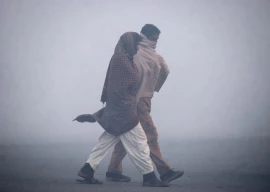
The death penalty discussion in Pakistan is coloured by the exploding terrorist threat that the nation is experiencing. Death penalty proponents argue that terrorists are like mad dogs that must be ‘put down’, due to their incapability of acting peacefully in society. However, euthanising human beings is something governments have moved away from, in favour of an approach that values the sanctity of life, regardless of whose life. Under international law, agreements decrying the death penalty have been signed or accepted by most countries. The Universal Declaration of Human Rights and other human rights treaties emphasise the importance of the right to life. More specifically, the UN General Assembly passed a resolution in 2008 to prohibit the use of capital punishment. Though 105 countries agreed to this resolution, Pakistan voted against its adoption. Death penalty proponents would argue that Pakistan is in a unique position and the nations prohibiting capital punishment have not experienced the level of violence that Pakistan has. However, this belies the point that almost all South and Central American countries agreed to prohibiting the use of capital punishment, even though they continue to deal with a narco-terrorism problem that has left thousands dead.
The argument could be made that the use of the death penalty in Pakistan is a method of deterring the growing tide of young people joining extremist organisations and killing fellow citizens. The problem with this assumption is that the death penalty has not proven to be successful in reducing crime. This is true for the mindset of some terrorists, which views death as a rite of passage to be welcomed, rather than a fate to avoid at all costs.
The UN Committee on Crime Prevention and Control has stated that research has failed to prove that executions deter crime more effectively than life imprisonment. However, in a country like Pakistan, where jailbreaks seem to have become the norm, capital punishment proponents would argue that the state is incapable of keeping these dangerous people in prison to serve their full sentences. However, killing prisoners because the state can’t keep them in jail seems to be like burning down the barn to slaughter one cow. There is also the issue of wrongfully accused individuals on death row. It seems counterintuitive to vest the expansive power of determining whether a suspect lives or dies to a state that cannot perform the basic task of securing its jails.
Still, one could argue that a nation strapped for resources could prefer killing prisoners through the death penalty as a cost-effective alternative to imprisoning the individual for life. However, it is, in fact, cheaper to imprison an individual for life than place them on death row because of the legal costs associated with the multiple levels of appeal a suspect has to access before the state decides to take his/her life. This is important in Pakistan, where there are nearly 8,000 individuals on death row.
Some cite the psychic healing that capital punishment provides, as it satisfies the desire for revenge. This should not be taken lightly and one hopes that the state can provide some kind of remedy to those who have lost a loved one to a brutal crime. While the remedy could satisfy base desires for revenge, it could alternatively seek to provide justice through other means like life imprisonment. South African social rights activist Desmond Tutu once said that “to take a life when a life has been lost is revenge, not justice”. Perhaps, Pakistan has seen more than its fair share of vengeful pursuits. Perhaps, it is time to recognise what differentiates the people and their state from extremists, who wantonly disregard the value of human life. Perhaps, not.
Published in The Express Tribune, August 25th, 2013.
Like Opinion & Editorial on Facebook, follow @ETOpEd on Twitter to receive all updates on all our daily pieces.
COMMENTS (8)
Comments are moderated and generally will be posted if they are on-topic and not abusive.
For more information, please see our Comments FAQ

1726117332-0/Megan-Thee-Stallion-(1)1726117332-0-165x106.webp)

















@aqib I hope Pakistan decides to do what works instead of relying on an old book as the solution for everything (especially when the solution prescribed in the book are proven to be ineffective compared to other more humane solutions).
@John B You can look at European countries, they have very lenient criminal punishments but still have one of the lowest crime rates. The focus should be on rehabilitation instead of punishments. A compassionate society should try to understand why the criminal committed the crime and then deal with it instead of completely ignoring the root cause of crime and focusing on revenge and in the process, killing countless innocent people who just happen to be at wrong place at wrong time. There is a reason why civilized world (including many US states) have done away with Death penalty.
Why do a lot of European countries don't have death penalty.....why?
Could you please explain which of the US desires did death penalty of Aimal kasi satisfy ?
@faraz: They don't feed them for the rest of their lives, just until they are transferred to a prison where they can be freed by their friends!!!
It would have been better if the author had also bothered to give the view of 'the Greatest of Books' on death penalty...but perhaps that is going out fashion nowdays.
I am against the capital punishment but,like the author, I cannot give proof for or against the merits of capital punishment versus other forms of punishment.
All I can say however, is that the past and current criminal justice systems practiced across the world do not deter crime, from theft to murder.
What do I do with the guy who is a rapist, thief, or a murderer ? Either I can move away from him or send him away. Since I do not want to move, I use my power in my collective strength to send him away for life to prison, island or even to gallows.
What happens to my personal morality here? Since the majority agrees with me, since they also do not want to move away from the rapist, my personal morality of punishing a fellow human being must be correct.
Certain questions are beyond clear answers.
Each society must decide what kind of punishment they want to impose. Some method may be barbaric to outsiders but the end result is the same. Punishment. Who gives me authority to punish my fellow human, who has become a rapist? I don't know. Everyone does the same, so it must be right.
As humans, we need a radical thinking in criminal justice system. This area is still the same as it was since prehistoric times.
I ask this out of curiosity and lack of knowledge but I think some 35 states in America still have the death penalty ............... why ? In your aggument you have ignored the fact that in Pakistan religion plays a major factor in the making of laws so the approach would have to be a cautious one relying on wisdom and an acute sense of balance.
Right, killing 25,000 militants in military operations and drone attacks is fine. But once militants are arrested, feed them for the rest of their lives